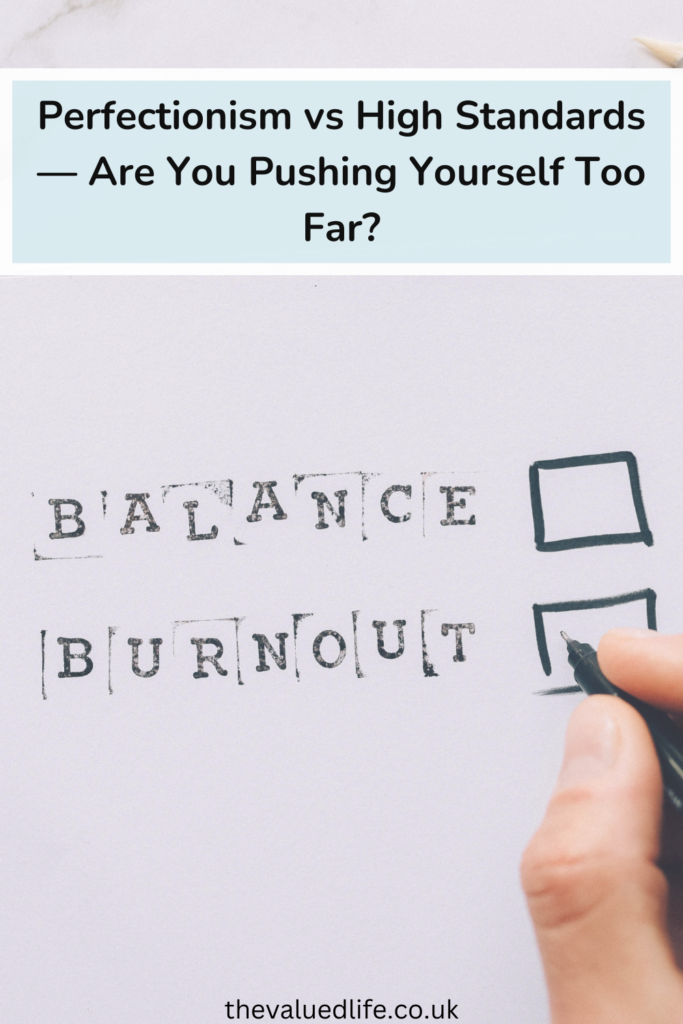Are you a perfectionist or do you just have high standards? If you’re wondering if I am asking you a trick question then you’re probably a perfectionist. Problem solved.
But if you’re not sure or it’s a question you never thought about, stick around to find the answer.
In this article, I explain the difference between perfectionism and high standards, give you some steps on how to know if your standards are unrealistic and then I give you some realistic examples in the 8 areas of life.
You’re welcome!
Also, as a Mindset and Productivity Coach (and a recovering perfectionist myself), I spend a lot of my time helping clients identify the differences and make the necessary changes in their lives.
What’s the difference between having high standards and being a perfectionist?
Perfectionism is highly fear-based. If you’re a perfectionist you put a lot of pressure on yourself to get everything perfect all of the time. BUT, unfortunately (or fortunately) perfection just doesn’t exist.
It’s unrealistic to expect so much of yourself.
So, if you are struggling with perfectionism, you have UNREASLISTIC standards for yourself and others.
Whereas, having high standards means that you set goals that are challenging but fundamentally realistic with proper diligence and effort. It’s all about working hard and doing your best while also accepting that mistakes are part of the process. It’s not a fear-based response because there is an understanding of the role process and growth mindset plays in success.
Honestly, there is a trap that a lot of perfectionists constantly fall into, it’s a trap that I know so well and actively try to avoid.
It’s thinking that you actually have high standards and convincing yourself that your unrealistic standards are, in fact, realistic.
I used to praise myself for my ‘high standards’ and ‘high achiever’ status while simultaneously beating myself up for not achieving my goals. I used to tell myself that it was because I was ‘not good enough’ and needed to try harder.
It never once crossed my mind that my goal of getting everything right all the time was unrealistic. I assumed the flaw was within myself and pushed myself through cycles of go-go-go and burnout over and over again.
When you have high standards, you have boundaries, you meet your needs, and you put processes in place so that you can achieve your goals.
You DON’T waste time obsessively procrastinating by researching ways to do things, beating yourself up for not getting everything done and burning out every 6 months.
Instead, you say ‘no’, you learn from your mistakes and adjust your expectations based on the resources you currently have.

In simple terms…
High Standards:
- Focused on growth and learning
- Accepting things won’t be perfect, but still aiming for your best
- Doing the best with what you’ve got
- Progress over perfection, always
- Ambitious but realistic goals
- You actually celebrate your wins
- Learning from challenges without beating yourself up
- Maintain a healthy work-life flow/integration
Perfectionism:
- Mistakes equals failure. There is no middle ground
- Overthinking every detail
- Constant feeling of “not good enough”
- If you’re not instantly amazing, you don’t even start
- Achievements never feel like enough
- Overworking yourself to burnout
- Procrastinating due to the pressure
- Constantly ‘researching’ without taking action
How do you know if your standards are unrealistic?
It’s all about checking in with yourself and being brutally honest because sometimes we’re actually just delusional.
I hold my hand up to that. For example, sometimes I still default to perfectionism and think that I can write a blog post every single day since I’m doing it full-time when in reality that’s not possible for me. So far my record has been 17 in one month so tell me why I still sometimes convince myself that I can bang out 25+ blog posts with ease.
Delusion.
But obviously, I have my methods for checking in with myself and I correct myself quite quickly now.
Here’s what I recommend you do:
- Track your time: Start timing yourself on tasks. If you’re consistently running out of time, that’s a BIG sign that something isn’t right and needs changing.
- Pay attention to your energy: How do you feel after you’ve been working on a task? If you’re constantly drained or stressed, your standards might be unrealisitc.
- Look for patterns: Notice if you’re always struggling with the same types of tasks or goals. Maybe you need to change things around and make amendments. Learning from your patterns is a fast way to develop a growth mindset
- Be honest: Ask yourself if your goals are achievable with your current resources. Are you expecting to move mountains with a shovel?
- Be kind to yourself: There is absolutely no point in beating yourself up over your productivity and standards. You’re only going to feel like crap and stay stuck.
You need to be real with yourself and make adjustments.
When you are realistic you can ACTUALLY move forward with your goals and maintain high standards. You just need to work WITH yourself, not AGAINST yourself
Journal prompts to help you figure it out
- How do I feel when I make a mistake? Do I see it as a chance to learn or a sign of failure?
- Do I procrastinate because I’m afraid I won’t be able to meet my own expectations?
- What’s my inner story/dialogue when I don’t meet my goals? Do I encourage or criticise myself?
- How often do I delay starting something because I feel like I’m not ‘ready enough’?
- Do I find it hard to delegate tasks or ask for help because I think I can do it better myself?
- When I complete a task, do I feel proud of my effort or dwell on what could’ve been improved?
- How do I respond when others give me feedback? Am I open to it, or do I get defensive?
- Do I avoid trying new things because I’m afraid of not being good at them right away?
- How often do I compare myself to others and feel like I’m falling short?

Examples of high standards vs perfectionism in the 8 areas of life
I’ve provided realistic (in my opinion) examples in the different areas of life to help you identify if you’re being perfectionistic or having healthy high standards. These are examples I may or may not have found myself in the past… Anyway, I find examples help put things into perspective.
1. Personal and Spiritual Growth
- High Standards: You decide to start journaling to help develop your self-reflection skills and improve your self-awareness. You aim for 10 minutes a day in the evening but understand that some nights you might forget.
- Perfectionism: You decide you want to write 3 detailed journal entries every night recapping your whole day and analysing your actions. You feel like a failure when you miss a day or write less than 3 pages
2. Health and Fitness
- High Standards: You aim to work out regularly, eat well, and work WITH your body by paying attention to your energy levels
- Perfectionism: You beat yourself up if you miss a workout or eat something you deem to be ‘unhealthy’. If you make a mistake you feel like the whole day is ruined and you have to start again tomorrow/next week.
3. Family/Friends
- High Standards: You love spending time with your family and friends and make an effort to stay in touch with them. However, sometimes your life gets super hectic and you have to adjust how often you see them. You let them know when you’re available and keep them informed
- Perfectionism: You feel really guilty if you can’t be there for everyone all the time and think you’re a bad friend or family member when you have to decline an invitation. It eats you up inside and you might even go to the event anyway even though you don’t have the capacity.
4. Romantic Relationships
- High Standards: You know you want to have mutual respect, affection and effort in your relationship and communicate your needs with your partner. However, you understand that your partner is only human and that you will learn and adapt together.
- Perfectionism: You expect your partner (or yourself) to be perfect, get upset when the relationship doesn’t look like a ‘fairy tale,’ and avoid being vulnerable by not saying what you truly feel
5. Career and Business
- High Standards: You work hard in your career and proactively set professional goals with your manager that help you move up the career ladder. When you make a mistake, you own up to it and find ways to make corrections. You treat it as a learning opportunity
- Perfectionism: You feel like a failure when you don’t meet every goal perfectly or achieve success immediately. You procrastinate out of fear that your work won’t be good enough and spiral when you make a mistake.
6. Financial Health
- High Standards: You are responsible with managing your money. You diligently save, spend within your budget and are currently learning how to invest.
- Perfectionism: You obsess over every single penny and feel anxious when spending money on non-essential items. You constantly feel like you’re behind financially even if you’re making progress.
7. Fun and Recreation
- High Standards: You make time for self-care days and actively pursue new hobbies and interests. You love trying new things and are okay with being at a beginner level.
- Perfectionism: You feel guilty for taking breaks or think you should excel at every hobby you take up. You avoid trying new recreational activities for fear of not being immediately good at them.
8. Physical Environment
- High Standards: You keep your space clean and organised because it helps you feel calm and focused, but you’re okay with occasional mess during busy times.
- Perfectionism: You feel anxious if your home isn’t spotless and spend excessive time organising or cleaning, even when it’s not practical. You feel uncomfortable in any environment that’s less than ‘perfect.
So do you have perfectionism or high standards?
So in conclusion, if you’re someone with high standards, you ultimately believe you are a human being with normal flaws but still work towards challenging goals.
If you’re a perfectionist, you believe you are a failed superhuman. You have goals that only the most perfect superhero could achieve and believe you are consistently falling behind and not good enough.
When I was healing from my perfectionism, I used to tell myself this every time I tried to set an unrealistic goal ‘I am NOT a superhero!’.
For some reason, it really helped to put things into perspective and help me choose a more realistic ‘human’ goal. BTW these goals can still be ambitious, I’m not advocating giving up on your dreams or anything, rather just being realistic about what YOU can do with the resources YOU have.
Join the community of recovering perfectionists healing from hustle-culture
If you would like to receive productivity and self-development tips designed specifically for perfectionists PLUS exclusive coaching offers join my weekly newsletter ‘The Sunday Reset’.
Remember, you are the ONLY person you are going to be with for your whole entire life, so you might as well invest in yourself.
Investing in yourself can be in the form of coaching, courses, reading, journaling, practising self-care and many more things.
Related Posts:
- How To Handle Criticism As A Perfectionist – 9 Simple Ways
- Where Does Perfectionism Come From?
- 3 Types of Perfectionism – Which One Are You?
- 13 Subtle Signs You’re A Perfectionist And Don’t Even Know It
- My First Year of Blogging – 5 Lessons Learnt From Overcoming Perfectionism
- How To Make Decisions as a Perfectionist – 10 EASY steps
- How To Deal With Mistakes as a Perfectionist – 9 Simple Ways!
- 7 Important Boundaries Perfectionists NEED To Set Without Guilt!
- 11 Perfectionist Productivity Myths You Need To Let Go
- STOP Saying These 7 Toxic Perfectionist Phrases To Be Successful






